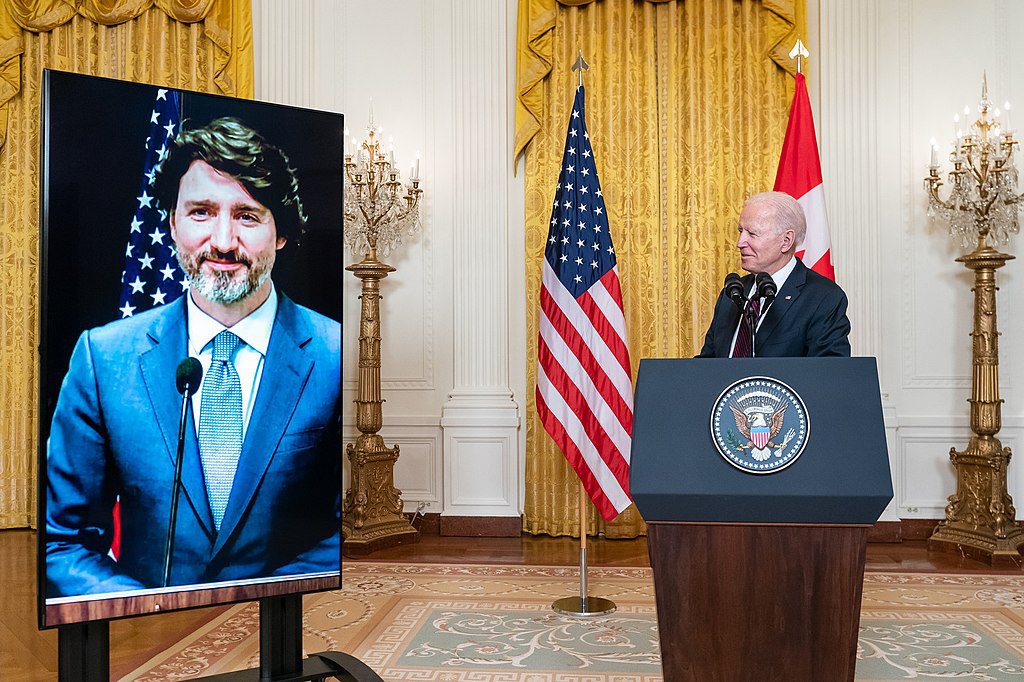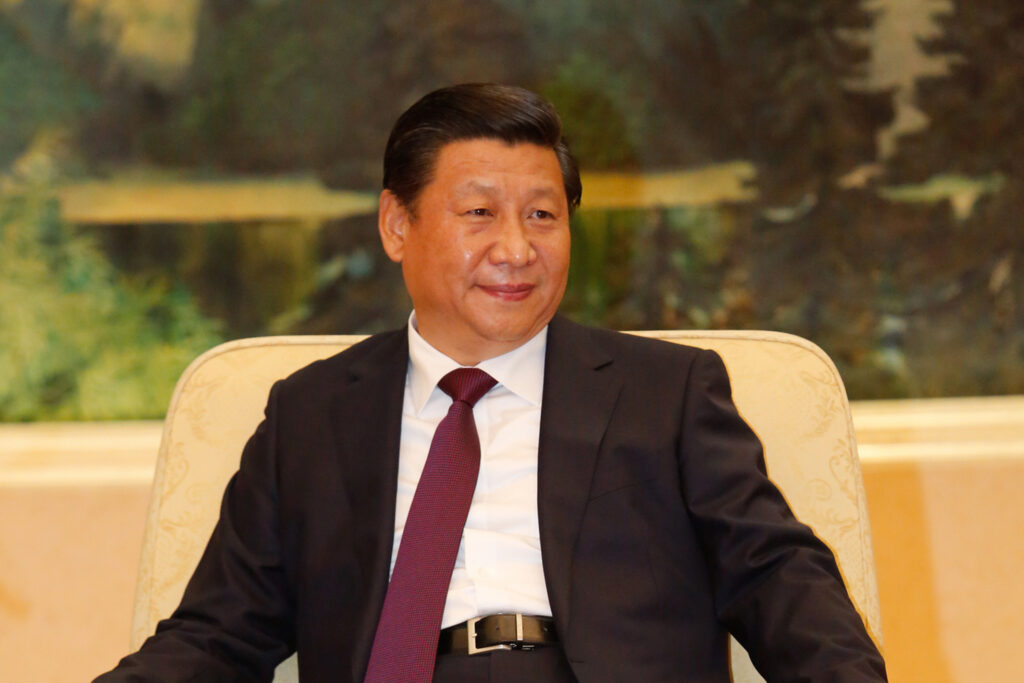By: Lauren Schulsohn and Jacob Wisnik
NEW YORK — The Biden administration has expressed an interest in reinvigorating U.S.-Canada relations following a virtual meeting between President Joe Biden and Prime Minister Trudeau early February. The meeting, which was the first between the then newly-inaugurated president and a foreign head of state, focused on each country’s response to COVID-19, economic cooperation during the pandemic and moving forward, as well as other shared interests among the two close allies. As the White House begins forming its foreign policy objectives and global leadership, it is essential to consider the current state of U.S.-Canada relations and where the two countries may be headed moving forward.
“Generally in world politics, there are no permanent friends, but permanent interests. But, there is supposed to be a special exception for some countries,” said Brian Bow, director at the Center for the Study of Security and Development at Dalhousie University in Nova Scotia, in an exclusive interview with Glimpse from the Globe. “It is not unique to the U.S.-Canada relationship, but Canada has a special relationship with the U.S. and Canadians were happy with that in the first half of the Cold War.”
When former President Richard Nixon reformed the United States’ economic policy in 1971, which is often referred to as the “Nixon Shock,” along with leaving the Gold Standard, Nixon began putting tariffs on products leaving the United States.
“Most countries reacted with hostility, but no one was more surprised than the Canadians,” Bow said. “They assumed it was a mistake that they weren’t on the list of countries that wouldn’t need to pay these surcharges.”
Following the change invoked by Nixon in U.S. international economic foreign policy, Canada had to do some “soul-searching,” as Bow said. Canada began realizing that they needed to have other partners rather than just entirely relying on the United States. Canada tried to diversify its economic partners, but ultimately failed, as penetrating new markets, especially in Asia, can be pricey and full of uncertainty. As a result, the U.S.-Canada Free Trade Agreement was signed in 1989, signaling that economic relations would return to normal. This agreement; which eliminated all tariffs on trade, was a precursor to NAFTA, which was then enacted in 1994.
“Even since then, there have been these recurring periods where Canada hasn’t liked the direction the U.S. has been going in,” Bow said. “The controversy with the Bush administration over the war in Iraq in 2003 was a big one, and the election of the Trump administration in 2016 was another one.”
Bow believes that the current administration in Ottawa is better aligned with President Biden than it was with Trump. That said, he believes there is a possibility of Trump-like rhetoric making its way into Canadian politics in the future.
“When I was a teenager in Canada, stylish clothing would make its way about five years after it appeared in America,” Bow said. “The same thing can happen with policies and parties in Canada trying on Trump-style rhetoric.”
The possibility of conservative politicians in Canada imitating the populist and often provocative language of Trump will certainly impact relations between the two neighbors. While this style of rhetoric is not prominent in Canada yet, Canadians, including Bow, are worried this could occur in the future. The next federal election in Canada could see a tight race between liberals and conservatives. Current polls show Prime Minister Trudeau with a narrow five-point lead, but Biden’s win may have an effect on Canadian elections. Many politically engaged Canadians are happy that the Biden administration will be holding office for the next four years; a recent poll showed that four in five Canadians hoped for a Biden win.
Canadians are excited and hopeful about the Biden administration’s position on various issues, namely climate change. Undoubtedly, the Biden administration is taking the threat of climate change more seriously than the previous administration. Already, Biden has appointed former U.S. Secretary of State John Kerry as the U.S. Special Presidential Envoy for Climate, a new position within the cabinet. Additionally, the U.S., as of February 19, has rejoined the Paris Agreement with the international goal of keeping global warming below two degrees celsius, needed to avoid the most catastrophic impacts of climate change. Canada is also a signatory of this agreement and has fiercely advocated for its importance. Most recently, on February 25th, Biden and Treadau announced that they would be coming together to reach their goal of net zero emissions by 2050 with their “U.S.-Canada Partnership Roadmap.”
The Partnership works to align the goals and climate policies of each country so that they can cooperate more efficiently. In addition to aligning policies, the plan hopes to create more policies and projects that will promote job growth, address inequality and combat the effects of climate change. Advocating for the creation of clean-energy infrastructure and ensuring that cross-border energy is renewable is at the core of this partnership. Biden and Trudeau also committed to having polluters take responsibility for their damages.
In addition to the announcement of the plan, Trudeau said that “U.S. leadership has been sorely missed over the past years… [it is]nice when the Americans are not pulling out all references to climate change and instead adding them.”
While both countries must implement long-term goals for climate change to protect our planet, the issue of COVID-19 has taken precedent this past year as over 500,000 people have died of COVID-19 in the U.S. alone as of February 2021.
During the initial meeting between Biden and Trudeau, COVID-19 was the primary focus. Both leaders agreed that cooperation in combating the virus was essential. Canada has struggled to vaccinate its population due to supplies being bought up by larger economies like the United States and United Kingdom. As part of his statement, Trudeau raised the idea of buying vaccines produced in the United States. Canada is currently receiving vaccines from Pfizer and Moderna plants in Europe and Biden’s team reportedly said that it was the administration’s priority to “ensure every American is vaccinated.”
It is unlikely, however, that the United States would sell vaccines produced domestically to Canada until late summer at the earliest. As of February 20th, 2021, only 2.43% of Canadians had received at least one dose of the vaccine compared to about 14% of the U.S. population.
Despite the challenges associated with vaccine distribution, the United States and Canada have committed to keeping trade as open as possible. The Prime Minister’s office emphasized “the importance of avoiding measures that may constrain the critical trade and supply-chain security between our countries” in a public statement. Economically, it is in the best interest of both nations to keep borders open and encourage trade to avoid unemployment and increase GDP.
Although Canadian and U.S. interests are more aligned than in previous years, on his first day in office, Biden signed an executive order to end the expansion of the Keystone XL pipeline, a project supported by the Government of Alberta, a provincial government of Canada. The Keystone XL pipeline, which began planning and construction in 2008, travels from Canada through Texas. The pipeline, which began operating in 2010, was scheduled for an expansion to be able to carry even more oil. Despite the pipeline providing economic benefits to both countries, Biden canceled the project in order to protect the environment and indigenous communities. A January statement from the White House said that “the President acknowledged Prime Minister Trudeau’s disappointment regarding the decision to rescind the permit for the Keystone XL pipeline.”
Bow said that the pipeline will hurt domestic relations between the local governments and the federal government in Canada, rather than hurting diplomatic relations between Ottawa and Washington. Given that Trudeau is substantially worried about political support in his country, this may be why he showed disdain for the cancellation of the project.
“The prairie provinces who are the major oil exporters in Canada are the ones who really desperately wanted Keystone to go through, and people in other parts of Canada don’t really care that much about it,” Bow said. “There are real differences between Canadians on those issues.”
While the Trudeau administration did not express as much distress about the cancellation of the project, in a statement released by the Government of Alberta, Premier Jason Kenney expressed his disturbance with Biden’s actions to cancel the Presidential permit for the Keystone XL pipeline. He highlighted the 2,000 jobs that would be lost due to the cancellation of the project. The statement also said, “That’s not how you treat a friend and ally.”
Even though some of the provincial governments may not support President Biden, there is no reason to believe that the Trudeau administration, which will be in office for at least the majority of Biden’s stay in the White House, will become hostile with the U.S. over this issue, especially as, since the cancellation of the project, Trudeau and Biden have already begun working on several projects together.
The future of U.S.-Canada relations looks hopeful as the two countries are already working together to tackle global issues such as climate change and COVID-19. However, the relationship between the two countries can change depending on the issues at hand and the administration holding office.
With the popularity of Trumpism in the United States and growing support of populism in Canada, both countries could experience major political shifts once the two leaders are up for re-election. However, until then, the neighbors will most likely continue to work cooperatively together and advance the two countries’ unique historical, cultural and geographical relationship.






